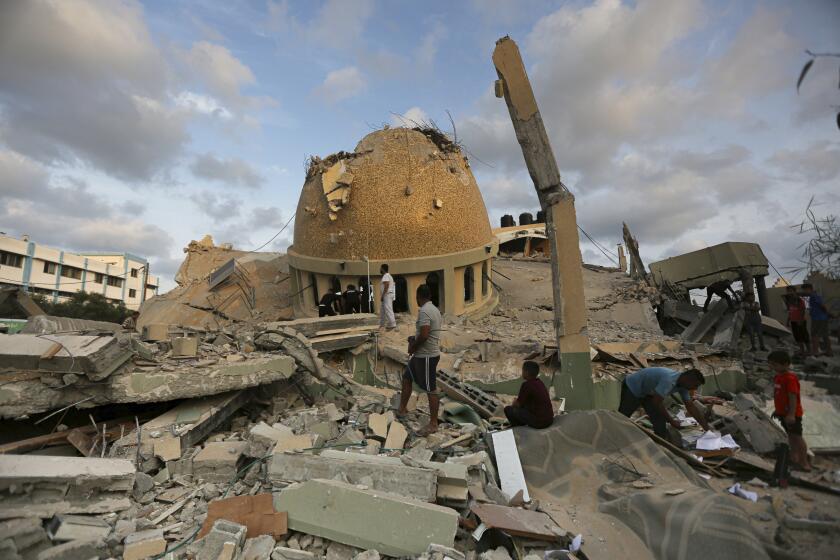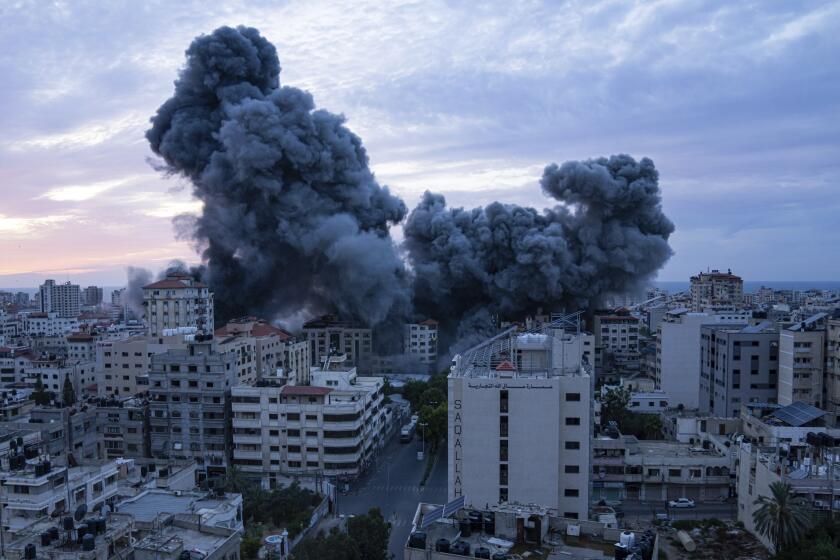News Analysis: Sudden war in Israel and Gaza upends regionâs diplomatic, political calculations

WASHINGTON â The Palestinian militant offensive against Israel on Saturday â possibly the deadliest and largest ever â will dramatically alter diplomatic and political calculations in the Middle East and deprive Washington of whatever leverage it has in influencing Israel, diplomats and analysts say.
Vowing âmighty vengeance,â Israeli Prime Minister Benjamin Netanyahu launched massive airstrikes on the Hamas-ruled Gaza Strip in response to the militant attacks that left hundreds dead and many abducted. Netanyahu declared his country at war and a full-scale but perilous ground incursion, 18 years after Israel withdrew from Gaza, is not out of the question, experts say.
The looming and urgent question then will be whether fighting extends farther into the volatile region, involving Lebanon or other areas where anti-Israel militants including Hezbollah are based.
Addressing his nation, President Biden pledged ârock-solid and unwaveringâ support for Israel and warned other countries hostile toward Israel not to take advantage of the moment to attack Israelis. Iran has already voiced support for Hamasâ actions.
âThe United States stands with Israel,â Biden said from the White House, flanked by senior Cabinet members. âWe will always have her back.â
Biden said he would personally handle the crisis directly with Netanyahu, a noteworthy gesture because the relationship between the two has been strained largely over the extremist nature of Netanyahuâs coalition government.
A possibly protracted â and broadened â Middle East conflict looms as Israel and Hamas militants trade fire, leaving hundreds dead on both sides.
âIsrael has the right to defend itself and its people â full stop,â Biden said.
Biden said heâs been in contact with members of Congress and directed his national security team to work with their Israeli counterparts on military and intelligence sharing. The presidentâs team is in frequent contact with leaders throughout the region, including those from Egypt, Turkey, Qatar, Saudi Arabia, Oman, the United Arab Emirates, the Palestinian Authority and European partners, he added. Before Bidenâs speech, the White House said he spoke to Jordanâs King Abdullah II.
As the death toll of Israelis and Palestinians rose steadily Saturday, the capture of numerous Israeli hostages by Hamas militants who infiltrated southern Israel constitutes a new element with unpredictable consequences. Hamas could potentially use the hostages as human shields against Israelâs retaliation.
In 1939, Armenians of Musa Dagh fled to Lebanon rather than submit to Turkish rule. Now they despair over the exodus from Nagorno-Karabakh and Azerbaijan.
Another immediate casualty of the unprecedented violence will be U.S.-backed efforts to open relations between Israel and Saudi Arabia, a highly prized, historic move that was gaining momentum in recent weeks.
To seal the deal, Saudi Arabia has been demanding a number of concessions from the U.S. and from Israel, including steps that would move the Palestinians closer to establishing an independent state. That concession has been steadfastly resisted by Netanyahu and his ultraconservative government, even though the Biden administration has insisted on the âtwo-state solution,â as it is known.
Hundreds reported killed in Hamas attack in Israel. Hundreds are dead in the Gaza Strip as the Israeli military retaliates, Palestinian authorities say.
âAny leverage the Biden administration hadâ to exact concessions from Netanyahu for improving conditions for the Palestinians âhas completely disappeared,â said Aaron David Miller, a veteran former Middle East envoy now at the Carnegie Endowment for International Peace.
Though perhaps not dead yet, Miller said in an interview, ânormalization has suffered a significant blow.â
âWe donât know where all of this is going, but bloodiness will be going up on all sides.â
Given the level of carnage, it would be impossible at this point for any Israeli prime minister to make concessions to the Palestinians, several analysts said. Similarly, the high death toll among Palestinian civilians would complicate any overtures the Saudis might have been willing to make toward Israel.
U.S. Secretary of State Antony J. Blinken was scheduled to travel to Israel, the Palestinian city of Ramallah, West Bank, and Saudi Arabia this month, but that trip may now be canceled. At a minimum, it will become a mission of crisis diplomacy instead of efforts to make progress on opening Israeli-Saudi ties.
Israel, Washington and allies were shocked by the sudden, massive scale of the attack, which was carried out with a degree of expansive complexity and sophistication never previously seen. Usual Palestinian assaults consist of rocket volleys that are readily intercepted by Israelâs efficient Iron Dome air defense system, or increasingly rare individual suicide bombers who target public transportation or civilian gathering points such as restaurants.
The specter of armed commandos infiltrating Israeli kibbutzim and towns was hard to imagine, until now.
Many observers of the region, however, have been predicting an explosion on the horizon â if not to this degree.
More Palestinians have been killed in the West Bank and Gaza by Jewish settlers or the Israeli military this year than in any other year in the last two decades. Israelâs 11-month-old government has been steadily deepening its military occupation of the West Bank, expanding Jewish settlements that much of the world considers illegal and failing to thwart vigilante attacks by the settlers. The Al Aqsa Mosque in Jerusalem, the third holiest site in Islam, has been raided by the Israeli military on several occasions in recent months.
At the same time, the U.S. and other international actors largely failed to pay attention, critics say, beyond occasional reproach of Netanyahuâs government and hand-wringing but little action.
Saturdayâs offensive came exactly 50 years after the start of the Yom Kippur War, when a coalition of Arab states, led by neighbors Egypt and Syria, launched surprise military operations against Israel â on its most holy of holidays â with the aim of retaking Israeli-occupied portions of the Sinai peninsula and Golan Heights.
âThis is so much bigger than anything weâve seen in the past, ... an attempt to show that it wonât be just the Palestinians who solely pay the price of the status quo,â said Khaled Elgindy, of the Center for Middle East Policy at the Brookings Institution, a Washington think tank.
âThe Palestinian cause has become a nonissue,â stoking Palestinian desperation, he said. âThis was a deliberate attempt to shatter [Israelâs] sense of complacency and comfort ⌠a very deliberate attempt to change the whole calculus,â and to force changes in international policy toward the Israeli-Palestinian conflict.
âI donât know that it will,â he added.
In fact, here and in Israel, a consensus was forming that the ways in which fighting between Israel and Palestinians has been resolved in the past, with each side stepping back from the brink after international mediation, at least temporarily, will no longer be enough to make peace. There may be no going back, some are saying.
At the White House, meanwhile, Biden was joined by Blinken and other senior national security officials for emergency meetings. Blinken was also telephoning world leaders and other senior officials, such as Israeli President Isaac Herzog and Foreign Minister Eliot Cohen, to decide on a course of action, a State Department spokesman said.
U.S. condemnation of the massive surprise attack was uniform and universal. European governments, too, which are usually more sympathetic to Palestinians than U.S. administrations, were highly critical of the attack.
Biden said he telephoned Netanyahu to âunequivocally condemnâ the âappalling ... horrific and ongoing attacks in Israel.â
âI made clear to Prime Minister Netanyahu that we stand ready to offer all appropriate means of support to the government and people of Israel,â Biden said in an earlier statement. âTerrorism is never justified. Israel has a right to defend itself and its people.â
Times staff writer Courtney Subramanian in Washington contributed to this report.
More to Read
Sign up for Essential California
The most important California stories and recommendations in your inbox every morning.
You may occasionally receive promotional content from the Los Angeles Times.














